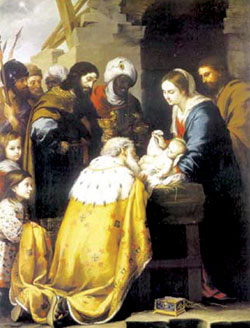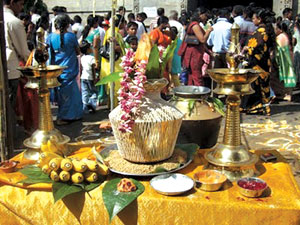|
Variety
Come January....
More significant events to
celebrate
January 1, 2011, is the first day in the calendar introduced by Pope
Gregory xii (1502 - 35) which is known as the Gregorian Calendar. It was
adopted in most of
|

Janus after whom the month
of January is named |
 |
Western Europe by 1752 and is now followed world-wide. But, there are
other days that mark the beginning of a new year, like April 13 or 14,
which is observed in our country as New Year's Day, the Chinese New Year
which begins in late January or early February and the New Year's Day in
the Muslim Calender.
New Year's day varies from year to year in the Muslim calendar which
is made up of lunar months, that is, months calculated from one new moon
to the next new moon.
|

Epiphany - the visit of the magi. |
January first is generally a holiday observed in all Christian
countries. Most of you must be aware by now that January is named after
Janus, the God of doors and gates. He is the god of beginnings and is
represented with two faces; one looking forward to the future and the
other backward to the past.
'In Japan too, January first is New Year's Day. "Japan is never more
Japanese than on January 1". This is the opening sentence in an article
in 'Japan News' issued by the Embassy of Japan. It says, "the home is
given a new look, the well is cleaned, linen and clothes replaced, old
transactions settled, any "debts of conduct", are forgiven and forgotten
and relationships are renewed.
"In the newly cleaned house the entire family sits for the customary
bowls of noodles, symbolising longevity. At the stroke of midnight
everybody can say, "akemashite umedeto gozaimas' - Cheers, the new year
has come.
Japanese children receive a gift of money from parents, grandparents
and other adult relatives. The money is put in a small paper envelope
called pochi bukro. Many Japanese recall the thrill of anticipation felt
as a child.
Commerce has stepped in, and taken pochi bukro into their hands. Now
pochi bukro with different colourful designs are for sale. However,
envelopes with traditional designs are still on sale. Adults enjoy
choosing an attractive and appropriate design, but kids are more
interested in the contents than in the design on the envelope.
Epiphany
Meanwhile, the Christian and Catholic community who celebrates the
birth of Jesus in December closes their celebrations with Epiphany on
January 6. It commemorates the visit of the Magi or the Three Wise Men
or kings, to the infant Jesus in the manger in Bethlehem. Although
Epiphany passes without any celebrations now, it is one of the three
principal and older festival days, in the Christian calendar, with the
other two being Easter and Christmas.
The festival originated in the Eastern church (Greek Orthodox,
Russian, Armenian) and marked the birth of Jesus.
In Armenian and other Eastern Churches Christ's birthday is
celebrated on January 6. Since the 4th century, the Roman Catholic
Church began celebrating Epiphany on January 6 to mark the visit of the
Magi.
In the West the evening before Epiphany is called the twelfth night;
It is the twelfth night after Christmas. One of Shakespeare's plays is
titled "Twelfth Night". The play has been given that name, because it
was first performed on the 12th night after Christmas.
Thai Pongal
Pongal is a harvest festival in Tamil Nadu, Karnatake and Andra
Pradesh in South India and in Sri Lanka. South Indian Hindus living in
countries like Malaysia and West Indies, also celebrate Pongal. Thai
Pongal falls on January 14 and occasionally on January 15 and the next
day is called Maadu Pongal, in honour of the bull (maadu) who has helped
the farmer in his cultivation and harvesting. The bull is bathed and his
horns decorated.
Makar Sankranti
  The
same harvest festival is called Makar Sankranti in North India. The day
is celebrated with the traditional gaiety and enthusiasm. Both Hindus
and Sikhs celebrate Makar Sankranti. The
same harvest festival is called Makar Sankranti in North India. The day
is celebrated with the traditional gaiety and enthusiasm. Both Hindus
and Sikhs celebrate Makar Sankranti.
They gather in the thousands at the gaily decorated temples and
Gurudwaras (Sikh temples). One of the main items of the Makar Sankranti
is a dip in the sacred tanks of various historic Gurudwaras and Hindu
temples.
Thousands of devotees take a dip in the Yamuna river at Delhi and at
Sagar Island at the confluence (where two rivers or river and sea meet
and become one) of the Ganga and Bay of Bengal. They pray to the sun god
before immersing in the cold water. Bengal Kshipra river at Ramghat in
Ujjaini is another place where devotees come, braving the cold weather,
to take their dip.
Some anniversaries.
Australia which for over a century was a colony of the British Empire
was made independent and proclaimed 'The commonwealth of Australia' on
January first 1901. January 1 is also Cuba's National Day. January 4 is
Myanmar's National Day, the anniversary of the cutting of all
connections with British rule, and declaration of Independence.
The First Boy Scout Group was also organised on January 1, 1908.
January 8 is the birth anniversary of S.W.R.D. Bandaranaike, the
fourth Prime Minister of Sri Lanka and the founder of the SLFP.
- Sumana SAPARAMADU |

